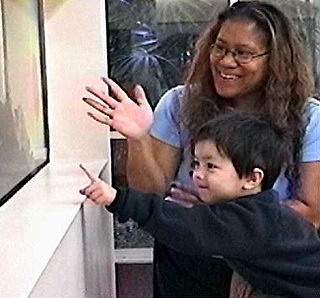Dyslexia, also known as reading disorder, is characterized by trouble with reading despite normal intelligence. Different people are affected to varying degrees. Problems may include difficulties in spelling words, reading quickly, writing words, "sounding out" words in the head, pronouncing words when reading aloud and understanding what one reads. Often these difficulties are first noticed at school. When someone who previously could read loses their ability, it is known as "alexia". The difficulties are involuntary and people with this disorder have a normal desire to learn. People with dyslexia have higher rates of attention deficit hyperactivity disorder (ADHD), developmental language disorders, and difficulties with numbers.

Cerebral palsy (CP) is a group of permanent movement disorders that appear in early childhood. Signs and symptoms vary among people and over time. Often, symptoms include poor coordination, stiff muscles, weak muscles, and tremors. There may be problems with sensation, vision, hearing, swallowing, and speaking. Often, babies with cerebral palsy do not roll over, sit, crawl or walk as early as other children of their age. Other symptoms include seizures and problems with thinking or reasoning, which each occur in about one third of people with CP. While symptoms may get more noticeable over the first few years of life, underlying problems do not worsen over time.
The diagnostic category pervasive developmental disorders (PDD), as opposed to specific developmental disorders (SDD), is a group of five disorders characterized by delays in the development of multiple basic functions including socialization and communication. The pervasive developmental disorders are autism, Asperger syndrome, pervasive developmental disorder not otherwise specified, Childhood disintegrative disorder (CDD) and Rett syndrome.
Dyscalculia is difficulty in learning or comprehending arithmetic, such as difficulty in understanding numbers, learning how to manipulate numbers, performing mathematical calculations and learning facts in mathematics. It is sometimes informally known as "math dyslexia", though this can be misleading as it is a different condition.
Diagnoses of autism have become more frequent since the 1980s, which has led to various controversies about both the cause of autism and the nature of the diagnoses themselves. Whether autism has mainly a genetic or developmental cause, and the degree of coincidence between autism and intellectual disability, are all matters of current scientific controversy as well as inquiry. There is also more sociopolitical debate as to whether autism should be considered a disability on its own.
The Eunice Kennedy Shriver National Institute of Child Health and Human Development (NICHD) is one of the National Institutes of Health (NIH) in the United States Department of Health and Human Services. It supports and conducts research aimed at improving the health of children, adults, families, and communities, including:

David Cyril Geary is a United States cognitive developmental and evolutionary psychologist with interests in mathematical learning and sex differences. He is currently a Curators’ Professor and Thomas Jefferson Fellow in the Department of Psychological Sciences and Interdisciplinary Neuroscience Program at the University of Missouri in Columbia, Missouri.
Developmental disability is a diverse group of chronic conditions that are due to mental or physical impairments that arise before adulthood. Developmental disabilities cause individuals living with them many difficulties in certain areas of life, especially in "language, mobility, learning, self-help, and independent living". Developmental disabilities can be detected early on and persist throughout an individual's lifespan. Developmental disability that affects all areas of a child's development is sometimes referred to as global developmental delay.

A reading disability is a condition in which a sufferer displays difficulty reading. Examples of reading disabilities include: developmental dyslexia, alexia, and hyperlexia.

The Rehabilitation Act of 1973,, is a federal law, codified as 29 U.S.C. § 701 et seq. The principal sponsor of the bill was Rep. John Brademas [IN-3]. The Rehabilitation Act of 1973 replaces the Vocational Rehabilitation Act of 1973, to extend and revise the authorization of grants to States for vocational rehabilitation services, with special emphasis on services to those with the most severe disabilities, to expand special Federal responsibilities and research and training programs with respect to individuals with disabilities, to establish special responsibilities in the Secretary of Health, Education, and Welfare for coordination of all programs with respect to individuals with disabilities within the Department of Health, Education, and Welfare, and for other purposes.

Autism therapies are interventions that attempt to lessen the deficits and problem behaviours associated with autism spectrum disorder (ASD) in order to increase the quality of life and functional independence of individuals with autism. Treatment is typically catered to the person's needs. Treatments fall into two major categories: educational interventions and medical management. Training and support are also given to families of those with ASD.

The American Association on Intellectual and Developmental Disabilities (AAIDD) is an American non-profit professional organization concerned with intellectual disability and related developmental disabilities. AAIDD has members in the United States and more than 50 other countries.
Developmental coordination disorder (DCD), also known as developmental motor coordination disorder, developmental dyspraxia or simply dyspraxia, is a chronic neurological disorder beginning in childhood. It is also known to affect planning of movements and co-ordination as a result of brain messages not being accurately transmitted to the body. Impairments in skilled motor movements per a child's chronological age interfere with activities of daily living. A diagnosis of DCD is then reached only in the absence of other neurological impairments like cerebral palsy, multiple sclerosis, or Parkinson's disease.
Johnny Lee Matson is professor and distinguished research master in the Department of Psychology at Louisiana State University. He was also named to 'Thomson Reuters' 2014 list of "The World's Most Influential Scientific Minds," for his work in the social sciences. Matson is recognized for his work on development, assessment and treatment of co-morbid conditions in developmental intellectual disabilities. Matson has extensively researched people with intellectual disabilities and autism spectrum disorders. However, his high number of self publications, self citations and peer review practices have been questioned by many in the field.

Intellectual disability (ID), also known as general learning disability and mental retardation (MR), is a generalized neurodevelopmental disorder characterized by significantly impaired intellectual and adaptive functioning. It is defined by an IQ under 70, in addition to deficits in two or more adaptive behaviors that affect everyday, general living.
Sexual abuse is common among people living with intellectual disabilities. Research published from 2000-2020 illustrates increased prevalence rates of sexual violence against people with intellectual disabilities when compared with the general population. While people with intellectual disabilities experience sexual violence in many of the same ways as the general population, they often encounter additional issues related to their disability and the environments in which they live. These issues can include increased vulnerability, questions around ability to consent to sexual activities, differential treatment before the law, social attitudes about intellectual disability and sexuality, and restricted access to suitable support and recovery services.

Autism spectrum, also known as autism spectrum disorder (ASD), is a range of mental disorders of the neurodevelopmental type. It included autism and Asperger syndrome and other neurodevelopmental disorders until 2013 when all disorders under ASD were reclassified as ASD instead of as individual disorders. Individuals on the autistic spectrum often experience difficulties with social communication and interaction and may exhibit restricted, repetitive patterns of behavior, interests, or activities. Symptoms are typically recognized between one and two years of age. Long-term problems may include difficulties in performing daily tasks, creating and keeping relationships, and maintaining a job.
Family support is the support of families with a member with a disability, which may include a child, an adult or even the parent in the family. In the United States, family support includes "unpaid" or "informal" support by neighbors, families and friends, "paid services" through specialist agencies providing an array of services termed "family support services", school or parent services for special needs such as respite care, specialized child care or peer companions, or cash subsidies, tax deductions or other financial subsidies. Family support has been extended to different population groups in the US and worldwide. Family support services is currently a "community services and funding" stream in New York and the US which has had variable "application" based on disability group, administrating agency, and even, regulatory and legislative intent.
Research in Developmental Disabilities is a bimonthly peer-reviewed medical journal covering developmental disabilities. It was formed in 1987 by the merger of Analysis and Intervention in Developmental Disabilities and Applied Research in Mental Retardation, which were established in 1981 and 1980, respectively. It is published by Elsevier and the editor-in-chief is Dagmara Dimitriou.
The Picture Exchange Communication System (PECS) is an augmentative and alternative communication system developed and produced by Pyramid Educational Consultants, Inc. PECS was developed in 1985 at the Delaware Autism Program by Andy Bondy, PhD, and Lori Frost, MS, CCC-SLP. The developers of PECS noticed that traditional communication techniques, including speech imitation, sign language, and picture point systems, relied on the teacher to initiate social interactions and none focused on teaching students to initiate interactions. Based on these observations, Bondy and Frost created a functional means of communication for individuals with a variety of communication challenges. Although PECS was originally developed for young children with autism spectrum disorder (ASD), its use has become much more widespread. Through the years, PECS has been successfully implemented with individuals with varying diagnoses across the aged span. PECS is an evidence-based practice that has been highly successful with regard to the development of functional communication skills.







